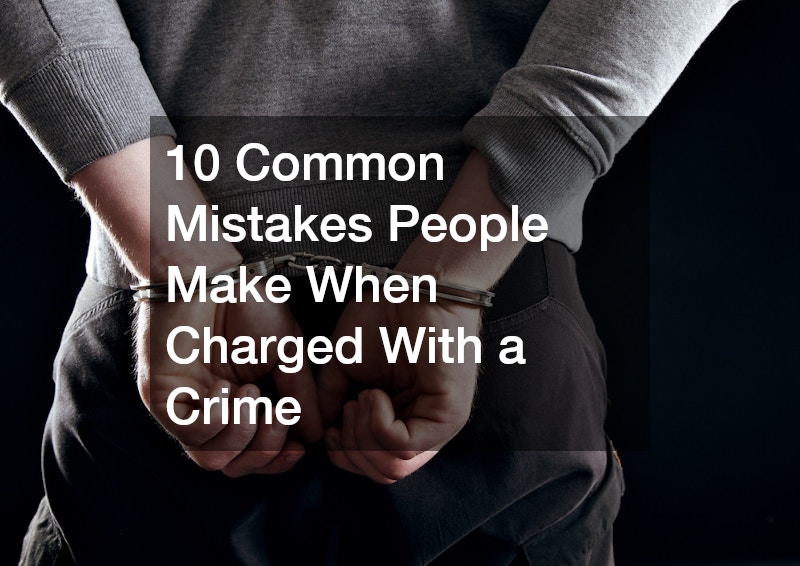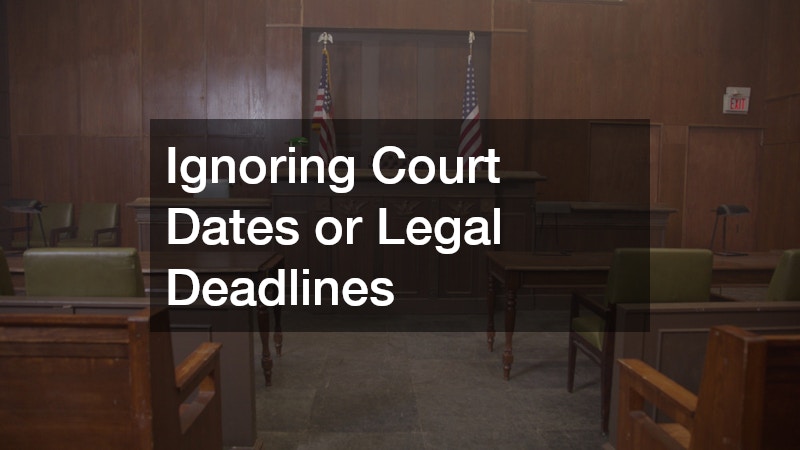

Facing criminal charges can be one of the most stressful and overwhelming experiences in a person’s life. Whether it’s a minor infraction or a serious felony, the way you handle the situation can significantly impact the outcome of your case. Many individuals make mistakes early on that can have long-lasting consequences, often without realizing the risks involved. Understanding common missteps can help someone charged with a crime avoid pitfalls and protect their rights effectively.
One of the biggest challenges people face is underestimating the importance of legal guidance. The legal system is complex, and even small errors—like speaking to law enforcement without an attorney or missing court deadlines—can derail a case. Many individuals also fail to grasp the implications of their own actions, from posting online to providing inconsistent statements. These mistakes can unintentionally strengthen the prosecution’s case and limit the options for a strong defense.
It’s also crucial to recognize that criminal charges don’t exist in a vacuum. The effects of a conviction extend beyond immediate penalties and can impact employment, family life, and personal reputation. Early missteps often make a difficult situation worse, creating unnecessary complications that could have been avoided. This blog will examine 20 common mistakes people make when charged with a crime and offer insights into why these errors are so damaging.
Understanding these pitfalls is particularly important for anyone who has recently been charged with a crime. Whether you are seeking a hit and run attorney, sexual assault attorney, or criminal defense attorneys, awareness of these mistakes is the first step toward protecting yourself and building a strong defense.
1. Speaking to Law Enforcement Without an Attorney

One of the most common mistakes people make when charged with a crime is speaking to law enforcement without legal representation. Many believe that cooperating immediately will demonstrate innocence or goodwill, but this can backfire quickly. Statements made without an attorney present can be misinterpreted, taken out of context, or used against you in court. Even casual comments can become evidence that strengthens the prosecution’s case.
A hit and run attorney often warns clients against volunteering information before consulting legal counsel. Police officers are trained to extract information and may use tactics that seem friendly but are designed to elicit admissions. Speaking without guidance can unintentionally create inconsistencies that damage credibility.
For someone charged with a crime, the risk is especially high if the situation involves unclear circumstances or conflicting accounts. An attorney can advise on what questions to answer and what to politely decline, helping prevent statements that could later be construed as incriminating.
It’s also important to understand that invoking the right to legal counsel is not an admission of guilt. On the contrary, it is a crucial step in protecting one’s rights. Legal representation ensures that communication with law enforcement remains strategic and controlled, reducing unnecessary risks during a highly stressful situation.
2. Failing to Exercise the Right to Remain Silent
Another serious error is failing to exercise the right to remain silent. Anyone charged with a crime has a constitutional right to avoid self-incrimination, yet many individuals speak freely without considering the potential consequences. Statements made in haste can be twisted to imply guilt or inconsistencies.
A sexual assault attorney often emphasizes that remaining silent until speaking with a lawyer is essential. Even innocent comments can be misinterpreted, and inconsistencies in storytelling can give the impression of dishonesty. The prosecution may use such statements to build a stronger case, making it harder to defend against charges effectively.
The pressure to explain oneself immediately is understandable, especially when emotions run high. However, taking time to consult a defense attorney allows you to respond accurately and strategically. Avoiding unnecessary conversation with law enforcement ensures that your rights remain protected throughout the investigation.
Remaining silent doesn’t mean being uncooperative—it means exercising caution. A defense attorney can guide how to communicate safely with investigators, helping to prevent statements that could later be used against you in court. This step is critical for anyone charged with a crime, as it directly affects the strength of your defense.
3. Ignoring Court Dates or Legal Deadlines

Missing court dates or legal deadlines is a surprisingly common mistake among those charged with a crime. Ignoring obligations, whether out of fear, forgetfulness, or misunderstanding, can have severe repercussions. Courts may issue warrants for failure to appear, and prosecutors can request harsher penalties.
Criminal defense attorneys stress that timely participation is fundamental. Even minor infractions, such as forgetting to file a required document, can complicate proceedings and limit options for plea negotiations. A missed court date signals noncompliance and can erode credibility in the eyes of a judge or jury.
For someone charged with a crime, staying organized and aware of all deadlines is critical. Calendars, reminders, and communication with legal counsel can prevent unintentional errors. Each missed date adds stress and legal jeopardy, making an already challenging situation more difficult.
Moreover, appearing consistently on time demonstrates responsibility and respect for the legal process. It helps maintain trust with your attorney and may influence how the court views your overall conduct. Avoiding this mistake is one of the simplest yet most impactful steps for preserving your defense.
4. Underestimating the Seriousness of the Charges
It’s easy for some to downplay criminal charges, assuming they are minor or will resolve quickly. This mindset is dangerous, as it can lead to inadequate preparation and poor decision-making. Underestimating the seriousness of charges can also result in missing critical opportunities to build a defense.
Even seemingly straightforward cases, such as a headstone-related incident or property damage, can carry long-term consequences. Charges may lead to fines, probation, or incarceration, and underestimating their severity often results in rushed or ill-informed choices.
Anyone charged with a crime should carefully assess the implications of their situation. Failing to recognize the stakes can prevent proactive measures, such as gathering evidence, securing witnesses, or consulting experienced counsel. A thorough understanding of potential outcomes helps individuals make informed decisions.
Approaching the case with full awareness allows for strategic planning. Recognizing the seriousness of charges ensures that every step, from communication to legal filings, is deliberate and aimed at protecting rights and interests effectively.
5. Posting About the Case on Social Media

Social media is a trap for those charged with a crime. Posting about the case, venting frustrations, or even sharing unrelated updates can be used as evidence against you. Prosecutors often monitor public accounts, and seemingly harmless posts can harm your defense.
A bankruptcy attorney may see parallels in how public statements can influence legal outcomes. Sharing opinions or details online can inadvertently contradict statements made to law enforcement or in court, weakening credibility. Once something is posted publicly, it’s challenging to control how it’s interpreted.
For someone charged with a crime, it’s best to avoid discussing the case online entirely. Silence protects not only the integrity of your defense but also personal privacy. Friends and family should be instructed not to post about the case as well, as third-party content can also become relevant in proceedings.
Maintaining discretion online is a simple yet powerful way to minimize risk. Legal counsel can provide guidance on what can be safely shared, helping prevent digital missteps from turning into legal setbacks.
6. Providing Inconsistent Statements to Police
Inconsistencies in statements to law enforcement are a common problem. Even small discrepancies can be exploited by the prosecution to suggest deception or guilt. Careless or contradictory answers often result from stress, fatigue, or a lack of legal guidance.
A personal injury lawyer may observe that inconsistencies, even in unrelated areas, can cast doubt on credibility. Someone charged with a crime must present a coherent and consistent account, which is difficult without professional advice. Statements made in haste can inadvertently create gaps or contradictions that are difficult to explain later.
Consistency is particularly important when witnesses or evidence are involved. A single inaccurate statement can be amplified in court, overshadowing truthful testimony. Avoiding this mistake requires careful preparation and a clear understanding of the facts from the outset.
Working closely with an attorney ensures that statements are accurate, strategic, and legally safe. Legal guidance helps prevent misunderstandings and protects against the risk of self-incrimination, allowing for a stronger defense.
7. Representing Yourself Instead of Hiring a Lawyer

Some individuals believe they can handle a criminal case without professional assistance. Representing yourself may seem like a cost-saving measure, but it often leads to poor outcomes. Understanding procedural rules, evidentiary standards, and courtroom strategy requires expertise.
Even a simple case, such as one arising from a catering dispute or incident, can become complicated without legal knowledge. Courts are designed for legal professionals, and self-representation can result in missed opportunities or procedural errors.
Someone charged with a crime benefits from the experience and advocacy of a qualified attorney. Legal counsel can negotiate with prosecutors, challenge evidence, and provide guidance that would be difficult for a layperson to navigate effectively.
Ultimately, hiring an attorney is an investment in protection and strategy. Choosing to represent oneself can be a costly mistake, jeopardizing rights, freedoms, and potential outcomes in a case that could have been managed more successfully with professional support.
8. Pleading Guilty Without Understanding the Consequences
A guilty plea may seem like a quick solution, but it carries long-term ramifications. Accepting responsibility without fully understanding the legal consequences can lead to harsher penalties than anticipated, including fines, probation, or incarceration.
Even when the charge involves something as seemingly minor as a bolt-related incident, a plea must be made with complete awareness of its effects. Courts treat guilty pleas seriously, and the decision may impact future employment, civil rights, and personal reputation.
Someone charged with a crime should always consult a lawyer before making a plea. Legal counsel can explain potential outcomes, alternatives, and strategic considerations, helping avoid irreversible mistakes.
Rushing into a guilty plea can also limit options for negotiating lesser charges or alternative resolutions. Understanding the full consequences ensures that decisions are deliberate, informed, and aligned with long-term interests.
9. Not Collecting Evidence or Witness Information
Failing to gather evidence or identify witnesses is another critical error. The strength of a defense often depends on timely and accurate documentation, and neglecting this step can leave important facts unrecorded.
For incidents like a local casino party dispute, eyewitness accounts, photographs, or surveillance footage can be crucial. Without proper collection, evidence may be lost, and the prosecution’s narrative may go unchallenged.
Someone charged with a crime should proactively work with legal counsel to preserve all relevant materials. Attorneys can guide on what evidence is admissible, how to collect it legally, and how to protect witness testimony.
Neglecting this process weakens a defense and can limit strategic options. Proper evidence collection ensures a more robust and credible presentation in court, making it a foundational step for anyone facing criminal charges.
10. Ignoring Legal Advice From a Defense Attorney
Finally, disregarding the guidance of a defense attorney is a costly mistake. Legal counsel has the expertise and experience to advise on strategy, communication, and procedural matters, and ignoring this advice can lead to preventable errors.
Even in cases involving travel trailers or seemingly minor charges, the courtroom requires careful planning and attention to detail. Disregarding professional recommendations often results in procedural mistakes, missed opportunities, or poor negotiation outcomes.
Someone charged with a crime should view their attorney as a critical partner. Following legal advice ensures that steps taken in the case are deliberate, strategic, and aligned with long-term goals.
Respecting and trusting the attorney-client relationship enhances the chances of a favorable resolution. Ignoring guidance undermines this advantage and may compromise the effectiveness of any defense prepared for court proceedings. Facing criminal charges is stressful and often overwhelming, but avoiding common mistakes can significantly improve the outcome of a case. Speaking to law enforcement without a lawyer, failing to exercise the right to remain silent, ignoring court deadlines, and underestimating charges are just a few of the errors that can have long-term consequences. Social media missteps, inconsistent statements, self-representation, premature guilty pleas, and neglecting evidence collection are equally damaging. Finally, ignoring legal advice undermines the advantage that professional guidance provides.
Anyone charged with a crime, whether seeking a hit and run attorney, sexual assault attorney, or general criminal defense attorneys, should understand that every action counts. Proactive measures, careful planning, and respect for legal counsel are key to protecting rights, preserving credibility, and pursuing the best possible outcome. By learning from these common mistakes, individuals can avoid unnecessary complications and focus on building a strong, informed defense that safeguards their future.

